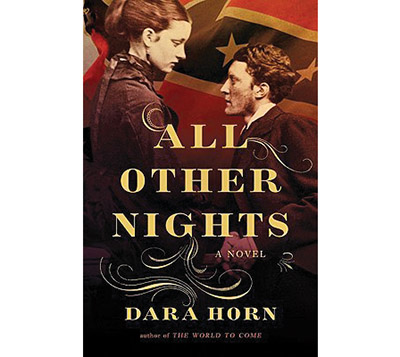
Reviewing: “All Other Nights,” by Dara Horn. W. W. Norton & Company, Inc., 355 pages. 2009. ISBN-13: 978-0-393-06492-6.
On the eve of his arranged marriage to the daughter of one of his father’s business contacts, Jacob Rappaport flees home to join the 18th Infantry Regiment of New York in its war against Confederate traitors. The year is 1861, and America is embroiled in controversy, enmity and war. Jacob intends to escape from his Jewish family through the army, but he is pulled back to his roots again and again as his uncle is found to be a Confederate agent and the daughters of another of his father’s business contacts are suspected of running a Confederate spy ring.
Jacob begins the story as a loyal Union spy, but when he is tasked with assassinating his uncle and marrying one of the daughters in the spy ring, he learns that the decisions he makes about his loyalties on both sides of the lines have far-reaching consequences to himself and to others. He learns that the line between “good” and bad” is extremely blurry and that love and retribution can be more powerful motivators than any allegiance. How will Jacob determine for himself what is “right” and what is “wrong”?
Join Jacob as he journeys through enemy lines to New Orleans, Washington, Mississippi, Philadelphia and Richmond; through four years of bloodshed from 1861 to 1864; and through spheres of war, business, espionage and courtship, always struggling to figure out what is right and what is wrong, whom to betray and whom to cherish. Follow him as he grows from a headstrong young soldier to a lovestruck bachelor to a broken, damaged veteran who has seen far too much.
But hope and love—and fellow Jews—can be found in the unlikeliest of places.
“All Other Nights” by Dara Horn is compelling Civil-War-era historical fiction based in meticulously researched historical facts, both enthralling and horrifying. Some of these facts are contained in short historical anecdotes sprinkled throughout the book that have little to do with the plot, but overall, the book is more about Jacob than it is about the war, as it should be.
Jacob is a compelling character because of how good he is at what he does; he is a competent businessman and spy—great at lying, weighing risks and judging how far he can push someone before that person breaks. But he is also generous and kind when he can afford to be, and sometimes even when he can’t. He is a character with whom you can empathize in his greatest triumphs and in his greatest sorrows. Though he is not very religious—he sets foot in a shul only a couple of times throughout the four years covered by the book—he always manages to find God when he needs Him most, and God does not let Jacob down.
Observant Jewish readers will catch the overt and subtle references to Jewish traditions and ideals. For example, Horn describes the beginning of the destruction of Richmond on the night of April 2, 1864, as “the plagues that night,” a subtle reference to the plagues that marked the beginning of the end of the Jews’ servitude in Egypt. And one of the themes of the book is “What you allow to happen one night will happen on all other nights as well,” a veiled reference to the famous question of Ma Nishtana, “Why is this night different from all other nights?” The title of the book, “All Other Nights,” is also taken from this essential question.
By Tani Greengart
Readers of this book will experience an informative-yet-touching tale of love, loss, right, wrong, prejudice, secrets, adventure, choices and ultimately, redemption.













